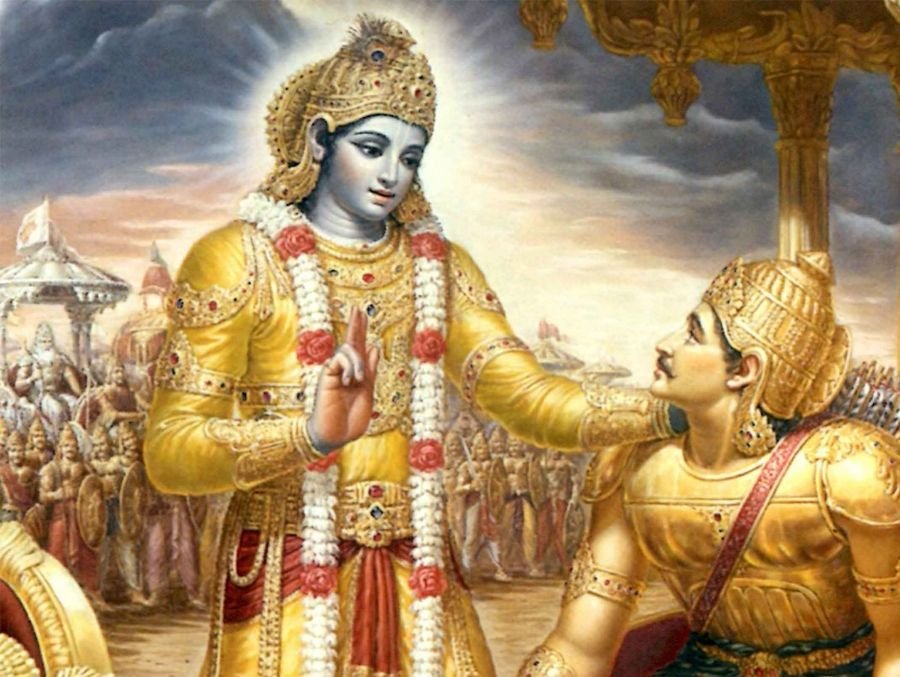(Image Courtesy Mahanidhiswami)
Balanced State of Mind Transforms the Person Inside-out
अर्जुन उवाच |
स्थितप्रज्ञस्य का भाषा समाधिस्थस्य केशव |
स्थितधी: किं प्रभाषेत किमासीत व्रजेत किम् || 2.54||
Arjuna uvācha
sthita-prajñasya kā bhāṣhā samādhi-sthasya keśhava
sthita-dhīḥ kiṁ prabhāṣheta kim āsīta vrajeta kim|| 2.54||
Shloka Translation
BG – Ch. 2- Ver. 54:
Arjuna said: What is the description of a person of steady wisdom, one who is established in equanimity, How does that person of steady intellect speak? How does he sit? How does he walk?
Explanation
Enlightened people are referred to as sthita Pragya and samdhi-sthithi. Arjun asks a reasonable question after hearing from Shree Krishna about the condition of Perfect yoga, or Samadhi. He’s curious about the nature of a person in this state’s mentality. He also wants to know how a person’s behaviour is affected by this holy state of mind.
Arjuna asks Shree Krishna sixteen sets of questions starting with this poem. Shree Krishna responds by revealing the innermost secrets of karma yoga, jnana yoga, Bhakti yoga, austerity, meditation, and other practices.
Arjuna was both a warrior and a practical man. As a result, he was less interested in theoretical concepts. He was curious about the mental and external characteristics of someone who radiated calmness. How a person interacts with the world are referred to as speaking and walking. The term “sitting” refers to his point of view and attitude toward the world. That’s what Arjuna was curious about.
Arjuna inquires of Krishna about a human being’s highest level of Perfection. The definition of a realized Person is given in the next verse by Krishna. He describes how the tumultuous senses attack the mind and lead it astray in verse.
He emphasizes the significance of the mind he claims that the intellect is dragged away by the mind that has been misled by the senses. And, He declares, once your intelligence is gone, you will perish. He discusses the need of maintaining control over one’s senses.
The majority of us have a fuzzy or confused perception of Perfection. An ideal person appears to be like any of us from the outside. Internally, though, there is a world of difference. We don’t have access to his interior state, thus we make the mistake of judging him based on irrelevant criteria.
As a result, we get it wrong, bestowing divinity on common individuals while assigning mediocrity to great sages. As a result, we lead ourselves up the garden path, which is why it is critical to have a precise definition of Perfection. So that we can figure out which way to go and which role model to follow.
Arjuna inquires about the ‘Sthitaprajna.’ Which translates to “what is his nature,” or “what his description is.”
Speech is one of the five action organs. The scriptures are written in such a way that when they mention one organ, they mean all of them. So the question is, how do the action organs work? A realized person is someone who has attained the state of Infinity while still being in the physical world.
What is the finite expression of the infinite? How does he sit,? When you sit, you are alone and disconnected from the rest of the world. As a result, the question concerns his inner nature. And how does walk? When you walk, you engage with the world around you. So, how does such a person interact with the outside world?
Verse & what we can learn
In Sanskrit, “sthitha” means stable and “pragya” means mind. In short, sthithaprgya is the stability of mind achieved by self control and steady wisdom. A person can be described as sthithapragya when he will always be in peace and will not be affected by the outcome of his deeds.
The path to attain sthithapragnya is not an easy task. Keeping oneself away from desires and emotions is not the way to achieve it. For that we should be like a lotus flower. Just how, a droplet of water cleanses the lotus leaf by taking away the impurities, without clinging to the surface, our mind too should let the emotions flow through it without letting them get attached to it.
When one achieves a balanced state of mind and state of perfect yoga everything about that person changes.
Change must start from within (inside out) and when we change the software everything about the way it functions changes.
To achieve this practicing daily meditation and leading a disciplined lifestyle is very important.
In the next verse, Shri Krishna answers Arjuna’s queries.
Let’s learn to live with “The Gita” via Meditation Affinity…
